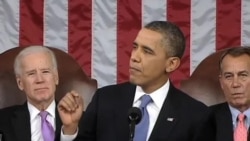WASHINGTON —
2014 will be a busy political year in the United States. President Barack Obama will outline his policy priorities when he delivers his State of the Union address on January 28. In November, voters will head to the polls to elect a new Congress, an outcome with potentially enormous political stakes for the president, as well as for lawmakers from both major political parties.
During last year's State of the Union address, Obama enjoyed a warm reception, fresh off his 2012 re-election victory.
“There is much progress to report,” said the president.
But 2013 proved to be a difficult political year for the president, primarily because of the rocky launch of his health care law.
Economic focus
Obama hopes to shift the focus this year to narrowing the income gap between the very rich and the middle class.
“In other words, we have got to make sure that this recovery leaves nobody behind and we have got a lot of work to do on that front,” he said.
Republicans are expected to continue to hammer away at the president’s health care law this year, said Republican strategist Ron Bonjean. “It is health care at this point. It is the incompetence going on within the Obama administration on how that is being handled.”
Slowing the growth of social welfare programs also is a Republican priority, according to House Speaker John Boehner.
“The president refuses, and Democrats, refuse to discuss changes to those programs unless Republicans are willing to raise taxes. We are not going to raise taxes,” said Boehner.
Expect Obama to highlight some encouraging signs in the U.S. economy and the issue of income disparity, said Thomas Mann of the Brookings Institution.
“How is the economy doing, and that is both jobs and growth and wages. But behind that is economic inequality and the ‘Two Americas’ issue,” said Mann.
Political maneuvering
Second-term presidents often have trouble regaining their political clout, said analyst John Fortier. “Usually presidents see their popularity ebb away a bit. They are often facing a Congress of the other party or at least part of the Congress, and so the president does not have the ability to work his agenda through the Congress as he did at the beginning of his first term.”
Also, Fortier added that political battles leading up to the November congressional elections are likely to dominate this year.
“The long term trend in midterm elections is that they go against the president. I think the big question for Republicans is 'can they get enough seats to win the Senate?'” said Fortier.
All 435 seats in the Republican-controlled House of Representatives will be at stake this year, along with one-third of the Democratically-controlled Senate and 36 state governorships.
During last year's State of the Union address, Obama enjoyed a warm reception, fresh off his 2012 re-election victory.
“There is much progress to report,” said the president.
But 2013 proved to be a difficult political year for the president, primarily because of the rocky launch of his health care law.
Economic focus
Obama hopes to shift the focus this year to narrowing the income gap between the very rich and the middle class.
“In other words, we have got to make sure that this recovery leaves nobody behind and we have got a lot of work to do on that front,” he said.
Republicans are expected to continue to hammer away at the president’s health care law this year, said Republican strategist Ron Bonjean. “It is health care at this point. It is the incompetence going on within the Obama administration on how that is being handled.”
Slowing the growth of social welfare programs also is a Republican priority, according to House Speaker John Boehner.
“The president refuses, and Democrats, refuse to discuss changes to those programs unless Republicans are willing to raise taxes. We are not going to raise taxes,” said Boehner.
Expect Obama to highlight some encouraging signs in the U.S. economy and the issue of income disparity, said Thomas Mann of the Brookings Institution.
“How is the economy doing, and that is both jobs and growth and wages. But behind that is economic inequality and the ‘Two Americas’ issue,” said Mann.
Political maneuvering
Second-term presidents often have trouble regaining their political clout, said analyst John Fortier. “Usually presidents see their popularity ebb away a bit. They are often facing a Congress of the other party or at least part of the Congress, and so the president does not have the ability to work his agenda through the Congress as he did at the beginning of his first term.”
Also, Fortier added that political battles leading up to the November congressional elections are likely to dominate this year.
“The long term trend in midterm elections is that they go against the president. I think the big question for Republicans is 'can they get enough seats to win the Senate?'” said Fortier.
All 435 seats in the Republican-controlled House of Representatives will be at stake this year, along with one-third of the Democratically-controlled Senate and 36 state governorships.






